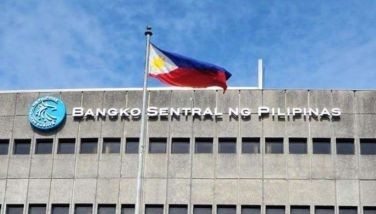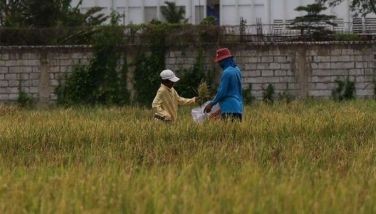Investors put Philippines on neutral

They are still bullish on the Philippines, Herald van der Linde, HSBC head of equity strategy for Asia Pacific explained to me and PhilStar business reporter Ted Torres. The political risk arising from our presidential election next year is making them a bit more cautious but van der Linde said he is keeping his “neutral,” rating on Philippine equities anyway.
The Dutch economist who is based in Hong Kong said the Philippines is still the most promising in Asean, citing our “resilient growth, high business confidence and positive earnings outlook.”
Early this year, he wrote a report that observed negative sentiment for Asean as a whole. The same report also talked about risks hiding in unexpected corners… I imagine one of those risks, as far as we are concerned, could well be our presidential election next year.
Indeed, the Washington-based Institute of International Finance (IIF) has come out with a report that was positive about the possible election of Sen. Grace Poe or Interior Secretary Mar Roxas to the presidency next year, but was cool towards Vice President Jojo Binay. IIF claims to be a global association of financial institutions, with close to 500 members from more than 70 countries.
IIF saw Poe and Roxas to be good for the Philippine economy, while “a Binay presidency may undermine the reforms introduced by the Aquino administration.” A previous report last month by IIF warned that “next year’s elections could prove challenging to the country’s economic transformation in recent years.”
I asked HSBC’s van der Linde what is it that financial analysts find most important in evaluating a country’s investment risk. In a word, he said, honesty, specifically of the president.
He explained an honest president means leakage of budgetary resources through corruption would be minimized. That means, in turn, there will be more resources available for education, health and infrastructure needed for economic growth.
An honest president would also assure investors a level playing field. We only have to remember the bad old days of the Marcos cronies. The late dictator’s crony capitalism severely damaged our economy, once way ahead of all of our Asean peers including Singapore.
But, I asked, what if a President is honest but he is surrounded by dishonest officials and friends he doesn’t have the heart to discipline?
It doesn’t matter much. It seems foreign financial analysts concentrate on the top guy which explains why seasoned bankers like Ruchir Sharma, the emerging market strategist of Morgan Stanley, was optimistic about P-Noy some years ago.
The reputation for honesty of our president-elect will determine how investors will view the country. No wonder the IIF was cool towards VP Binay, given the serious allegations of corruption that had been raised against him.
Binay’s competitive standing in the presidential race is one reason why investors will more and more stay on the sideline to wait and see.
“While a victory for Poe or Roxas would favor continuation of the current administration’s agenda and would be market positive, it is too early to tell how the market would react if Binay wins,” IIF said.
Oh well… We know it is more complicated than the perceived honesty of the president. Thus, a recent survey conducted by the Catholic Bishops apparently using scientific survey methods, show 46 percent of Filipinos say the President failed to accomplish his 2010 campaign slogan “kung walang corrupt, walang mahirap”.
That’s almost half of the population saying that Daang Matuwid is just a slogan because corruption lives…. Furthermore, 41 percent of the respondents were “unsure” on the topic, and only 13 percent considered the President successful in fighting corruption.
The nationwide survey was conducted by Veritas Truth Survey (VTS) during the second quarter of 2015 and headed by Dr. Clifford Sorita. It was answered by 1,200 participants from both urban and rural areas throughout the Philippines, chosen on a stratified random sampling with +/- 3% margin of error.
As for investors already in the country, they are also interested in more than presidential honesty. They want to know how the new administration will proceed with many reform measures they have proposed, but have not been acted upon.
For example, the European Chamber of Commerce wants a review and adjustment of the current taxation system which they feel is a drag to the country’s competitiveness.
European Chamber president Michael Raeuber warned we are likely to miss the boat again. There are now many companies leaving China looking for alternative locations for their manufacturing facilities. These companies “will be going to Vietnam and not here,” he said, unless we offer the right set of incentives and tax system.
“The ECCP has been encouraging European businesses to invest in the Philippines. We are also working closely with Philippine exporters not just to Europe, but also to other countries. There is a need to see some action,” he added.
Indeed, the Financial Times recently reported Vietnam has scrapped foreign ownership limits in an investment push. Foreign investors will soon be able to take 100 percent stakes in big Vietnamese companies as a means of pushing its economy further.
Such self confidence being shown by Vietnam in this aggressive policy change may be beyond reach for our rather parochial thinking public officials. Our rent seeking oligarchs have been using economic nationalism to keep their favored status, even if that means we all pay more for lousier products and services like our hopeless broadband connection.
Vietnam also instituted the new rules to step up its privatization program, strike trade agreements with the US and EU, and boost its status in the widely followed MSCI world markets indices. The 49 percent ownership cap on overseas investment in some industries will be removed from September, according to a published government decree.
Speaking of the EU reminds me of another missed opportunity for increased foreign trade and investments. The P-Noy economic managers have also been slow to propagate the news about GSP+ which will provide duty free entry to the EU for some of the most important Philippine exports. The GSP+ preferences cover over 6,200 tariff lines including fruit and foodstuffs, coconut oil, footwear, fish and textiles.
EU Ambassador Guy Ledoux explained, “It will bring tariffs to zero percent for two thirds of tariff lines including strategic products the Philippines is already exporting to the EU. This will immediately translate into savings of tens of millions of euros per year in foregone customs duties.”
The greatest benefit to be gained from GSP+ is the attraction of new industrial investments in sectors where relatively high tariffs are being slashed to zero under GSP+. These include established Filipino exports that are labor intensive such as pineapple juice (currently 28.5 percent), garments (currently five to nine percent), preserved fruits (currently six to nine percent), tuna (currently 20.5 percent), fruit jams and jellies (currently 20.5 percent) and footwear (currently 11.9 percent).
GSP+ significantly improves the attractiveness of the Philippines as a destination for new agricultural and manufacturing facilities for products that will now enjoy duty free access to the EU. Significantly, we are the only country in Asean with GSP+ so that even investors from the region will want to locate here to enjoy that benefit.
“The bottom line is more jobs for Filipinos in the Philippines,” Ledoux said.
Unfortunately, the luster of the economy has started to wane as election fever set in. Manufacturing output has fallen and net foreign direct investment halved to $1.2 billion in January-April from a year earlier.
“The slowdown in the Philippine economy is happening faster than we thought,” UBS bank economists wrote in a report, chopping their 2015 growth forecast to 5.7 per cent from 6.5 per cent.
The economy may experience a momentary boost with election spending and increased government expenditure, but that’s not sustainable. The business sector will evaluate the president-elect and slowly move depending on how the new leader is perceived.
Because foreign investors are looking mainly at our president’s reputation for honesty, the skepticism they have with VP Binay is understandable. This is specially because of recent Binay pronouncements on abolishing term limits and running with Bongbong Marcos. But even their more positive response to Poe and Roxas will be influenced by how fast the new administration responds to long felt needs and opportunities.
As HSBC’s van der Linde puts it, the important themes are “structural growth stories, a recovery in profit margins, quality of life (travel, healthcare, tackling pollution) and the rise of the Asian domestic investor.”
All that translate to a more livable, less polluted Metro Manila, Cebu and other key population centers. Civilized mass transit system, manageable traffic, ease in doing business, better social services and improved peace and order.
Let us hear the contenders talk about how they plan to make all those things that frustrated us during P-Noy’s watch happen at the shortest time.
Boo Chanco’s e-mail address is [email protected]. Follow him on Twitter @boochanco
- Latest
- Trending
























